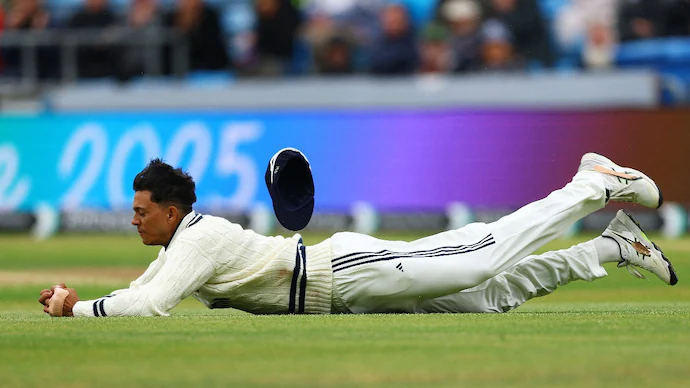Did the tail fail, or the fielders? Where the visitors faltered in the first India vs England Test
A new Indian team took on Bazball at Headingley and exceeded expectations on the opening day itself. The first India vs England Test saw Yashasvi Jaiswal becoming the first Indian opener to score a century in Leeds. The youngster, who debuted in Australia and the West Indies with centuries, kept the trend up to mark his Test debut on English soil with a century. Moving ahead in the game, Shubman Gill became only the fifth Indian to hit a century in his debut game as a captain. Rishabh Pant broke multiple records with twin centuries, and KL Rahul turned up as one of the best Indian batters in overseas conditions. All these records, and the visitors still ended up on the wrong side of the result against Bazball.
Dropped chances doom the visitors in the India vs England Test at Headingley
How do you gauge the impact of a player who scores a century but drops sitters around the field? Yashasvi Jaiswal reiterated his standing as a bright prospect for India's Test set-up, scoring a ton on his English debut. However, when it came to fielding, the youngster fumbled and how. Dropping one could be luck playing a prank on a player. However, dropping four catches at different fielding positions across two innings signals the player's shortcomings. Jaiswal, in the first innings, dropped Ben Duckett, who went on to score 62.
Next up, the youngster dropped Ollie Pope at 60 before the batter scored a ton to counterattack the 471-run lead imposed by India. In the same innings, Jaiswal dropped yet another, putting down a sitter at gully, letting Brook survive at 83. All the drops by Jaiswal came off the bowling of Jasprit Bumrah, the lone fighter on Day 2 of the India vs England Test. With Jadeja also dropping Duckett, Bumrah saw four of the chances created by him being buried in Leeds. Despite the massive setback, Bumrah scalped a five-wicket haul.
However, in the larger picture, the impact of these drops counted more than the visitors would have wanted. In the final innings, Jaiswal dropped Duckett yet again, this time off Siraj, who, unlike Bumrah, was livid. The English opener went on to score a ton in the chase, leading his team to a comfortable victory. India's fielding woes also included players going lax, with Shardul Thakur failing to collect the ball after slipping in the field as the English batters ran for three. Rishabh Pant, the wicketkeeper, was also the culprit at some crucial junctures, with the last falter noted against Jadeja, who managed to get an edge off Root.
No tail-end resistance from India in Leeds
The Indian tail was inexistent in this contest. Both the batting innings of the visitors witnessed a collapse. The India vs England match at Headingley marked the first time a team lost the match after scoring five centuries in it. However, a closer look at the proceedings in Leeds showcases that there was no one backing those centuries. The first innings had Yashasvi Jaiswal, Shubman Gill, and Rishabh Pant piling up respective tons. However, with the seemingly dead pitch of Headingley, it was not hard to understand that England’s batters would be in the contest too.
The ideal projection for the opening innings was a par 500-run score. Till the partnership of Gill-Jaiswal and later Gill-Pant, it looked well within reach. However, once the captain departed, it all came undone. Karun Nair, making his much-awaited comeback, departed for a 4-ball duck. All-rounders Ravindra Jadeja and Shardul proved inefficient as the visitors lost 6 wickets for just 24 runs to wrap up the innings at 471. Anticipatedly, England dashed most of the lead before India’s second batting innings, with the guests starting over with just a 7-run lead.
The next innings followed the same template. Rishabh Pant came up with another ton in the match, becoming only the second wicketkeeper after Andy Flower to score twin centuries in a Test. KL Rahul, meanwhile, converted his good start this time, scoring 137 and headlining India’s charge. However, once this duo departed, India lost its feet. This time, England bundled the last 6 for just 25 runs. The projected target slipped down as the visitors put England in a 371-run final chase, which eventually proved short.
Jasprit Bumrah alone isn’t enough, India’s attack exposed
The Indian bowling beyond Jasprit Bumrah proved toothless. Day 2 of the India vs England Test saw the speedster claiming three wickets in tough bowling conditions, and those three were all England lost that day. Despite Bumrah creating pressure from one end, dismissing Crawley early, Siraj and Prasidh Krishna could not maintain the same from the other. Krishna kept toying with the lengths as Siraj and he remained inconsistent with their line and length almost across the contest.
Shardul Thakur, introduced absurdly late into the attack, followed suit. The pace all-rounder went for an over 7.00 economy as England never experienced any pressure. In the final innings, England cruised through the opening stand without losing any wickets. Crawley and Duckett got to their respective centuries as the home team announced their dominance. With the conditions not aiding the bowlers and their fielders failing, the lack of chances created by the attack stood glaring at Headingley. While Shardul Thakur and Prasidh Krishna finally showed up with two wickets each on the final day, it didn't prove significant enough to halt Bazball and England’s charge to the victory.
